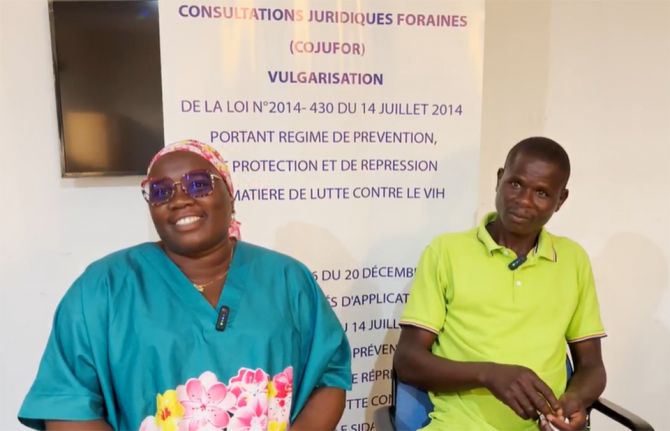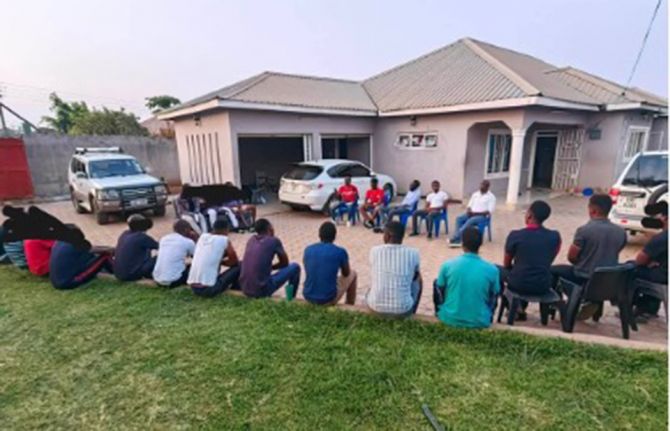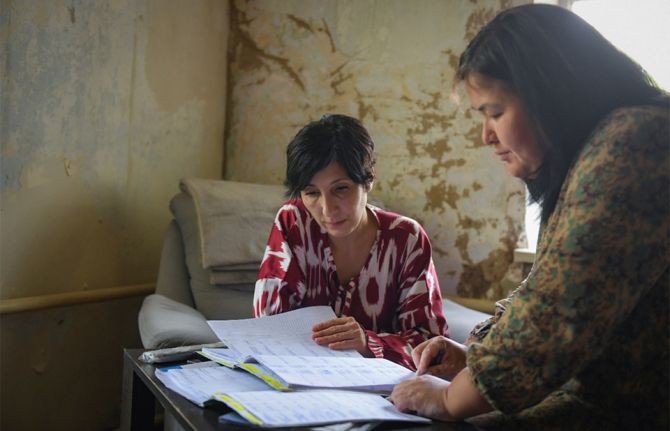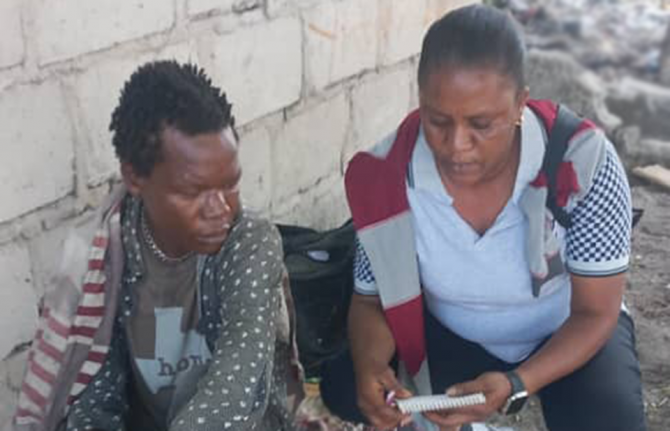

Update
UNAIDS is saddened by the death of Mathilde Krim
17 January 2018
17 January 2018 17 January 2018UNAIDS is deeply saddened by the death of the prominent AIDS researcher and activist Mathilde Krim. Ms Krim was a pioneer in AIDS research from the earliest days of the AIDS epidemic and a dedicated defender of human rights and justice.
Ms Krim was a research scientist, dedicated to increasing awareness around HIV. She was one of the Founding Chairmen of the Foundation for AIDS Research (amfAR), an organization dedicated to AIDS research, HIV prevention, treatment education and the advocacy of sound AIDS-related public policy.
Her activism, dedication and compassion were instrumental in influencing public policy mobilizing funds for AIDS research and protecting the human rights of people living with HIV or affected by HIV.
In 2000, Ms Krim was awarded the Presidential Medal of Freedom, the highest civilian honour in the United States of America.
Quotes
"Mathilde Krim was fearless, passionate and committed. She was a leading figure in the global response to HIV and highly respected for her evidence-driven, human rights focus which put people firmly at the centre. She will be sadly missed, but her work and her legacy will continue."

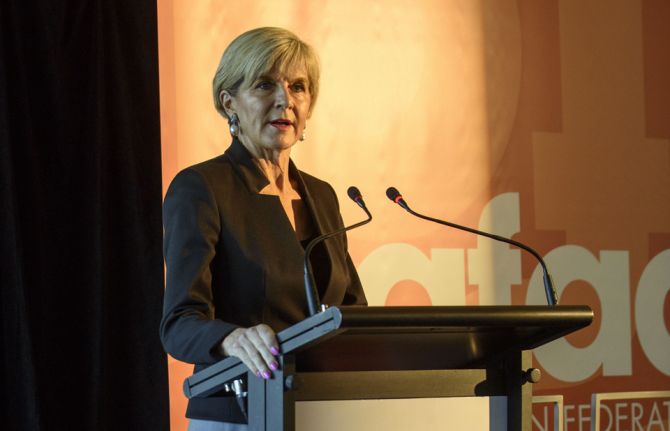
Update
UNAIDS and Australia strengthen ties to end AIDS
12 January 2018
12 January 2018 12 January 2018UNAIDS and the Government of Australia have signed a new five-year strategic partnership agreement to advance efforts to respond to HIV in the Asia–Pacific region. The agreement will focus on promoting evidence-informed, sustainable and integrated approaches to responding to HIV that promote innovation and address human rights, discrimination and gender issues.
The agreement highlights a shared vision to end AIDS and builds on the strengths and experiences of both Australia and UNAIDS to form a collaborative partnership. This partnership will enable a robust and sustainable response to HIV which is integrated into the wider context of health and sustainable development in the Asia–Pacific region.
As part of the agreement, Australia will commit AUD 22.5 million (US$ 17.1 million) to UNAIDS over five years from 2018 to 2022 to support UNAIDS in achieving the targets, goals and vision outlined in the UNAIDS Strategy: On the Fast-Track to end AIDS.
Quotes
“Australia is a strong and valued partner, particularly in the Asia–Pacific region. This new agreement will help us to build on this partnership and draw on our collective expertise and experience to Fast-Track the response to HIV.”
“I’ve always believed that Australia is most effective in tackling global challenges, and playing our part in tackling global challenges, if we do it in partnership. I’m pleased to announce today that the Australian Government will enter into a new partnership with UNAIDS specifically on the issue of the fight against HIV – AUD$ 22.5 million over the next few years to support UNAIDS in its work to increase our ability to fight this epidemic.”
Region/country

Update
Imams and faith leaders embrace HIV awareness in Côte d'Ivoire
19 December 2017
19 December 2017 19 December 2017Despite the scorching Abidjan heat, the Salam Plateau mosque stayed cool as imams, pastors, fathers and members of various religious groups along with women welcomed a UNAIDS delegation.
Imam Djiguiba Cissé gave an overview of his mosque and said that he and all the faith leaders gathered wanted to join UNAIDS in promoting HIV awareness.
Forty years of science and treatment have led to great progress in the AIDS response but now it's time to tackle stigma and discrimination, explained UNAIDS Deputy Executive Director Luiz Loures. Mr Loures reiterated that he needed faith leaders' help in making sure that violence against women is no longer tolerated and that men are better informed regarding HIV.
The imam said that compassion was a guiding principle of all faiths and that it should apply to faith leaders when they interact and care for people living with HIV. He also said that one of their objectives was to promote women. Women carry the greater burden of HIV globally and gender inequality is in large part responsible. Mr Cissé stressed that it was key to end violence against women and female genital mutilation. Female genital mutilation is prevalent in the north, north-eastern and western regions of Africa. Not only are there no known health benefits, it is painful and traumatic and can cause immediate and long-term health consequences to girls and women. The imam's final point to the congregation was to engage men to overcome some of these challenges and give young men a chance. More than 60% of Côte d'Ivoire's population is under 25 years of age, he explained, saying that more boys were resorting to migration or terrorism because they feel left out.
In January 2018, faith leaders led by Mr Cissé and with the help of UNAIDS are to attend an HIV awareness training encompassing the issues of stigma, status and empowerment.
Quotes
"We can be the decision makers because as faith leaders we can bring about change."
"I need you. You have proximity and know-how within your communities and that will lead to less stigma and discrimination in the AIDS response."
Region/country
Related

Update
Première Ligne in Geneva showcases safe injection centre to UNAIDS Board members
19 December 2017
19 December 2017 19 December 2017Sitting across from the bustling main Geneva train station, the lime-green block structure called Quai 9 stands out. The building houses a supervised drug injection centre run by the non-governmental organisation, Première Ligne. Quai 9 (track 9 in English) also provides primary health care services as part of its harm reduction drop-in centre to people who use drugs.
On the occasion of UNAIDS 41st meeting mid-December of the Programme Coordinating Board, the Switzerland government organized a visit for UNAIDS board members.
The visit highlighted how addressing the needs of injecting drug users through a public health and human rights-based approach, considerably reduces the risks of HIV infection and links people to health care.
The Swiss Ambassador to the United Nations, Mr Valentin Zellweger recalled how in the 1980s and 1990s, Switzerland had one of the highest incidence of HIV in Europe among people who inject drugs. In response to the crisis, Switzerland, introduced a “four pillars” policy, which focused on prevention, treatment, harm reduction and law enforcement.
One of the outcomes was setting up drug injection centres and increasing collaboration between the police and health care clinics.
As a result, HIV infections among people who inject drugs in Switzerland dropped precipitously.
Earlier in the week, Ms Ruth Dreifuss, former President of Switzerland, Health minister and current chair of the Global Commission on Drug Policy, had addressed UNAIDS board members. Ms Dreifuss, who spearheaded the four pillars policy during her tenure, said the evidence that harm reduction and decriminalization of drug use spoke for itself. She urged member states to leave no one behind by ensuring that drug use is treated as a public health issue. That call was further emphasized by members of the NGO delegation.
UNAIDS Deputy Executive Director Luiz Loures commended Switzerland for its innovative, multi-sectoral approach to harm reduction. He said that UNAIDS would continue advocating for evidence-informed, human-rights based AIDS responses such as Quai 9.
Quotes
The needs of women injecting drug users are very special and complex: the need to exchange sex for money and drugs, their special needs for protection. We try to be attentive despite them not always coming regularly.
Our role as policemen is not to judge but to adopt a pragmatic and realistic approach, and this has reduced the number of drug overdoses, fewer open drug scenes, and improved public health.
This is the type of good practice that needs to be highlighted and scaled up, and countries to head in that direction for public health and human rights imperatives.
It was very important to have this visit because this opportunity to interact with those working on the ground and with the beneficiaries is essential to guide our work.
Treating drug use as a public health issue has meant that Switzerland has managed to significantly reduce HIV infections among injecting drug users. This visit to Quai 9 demonstrates how our policy was implemented on the ground.
Evidence-informed and human rights-based policies and services that address drug use and people who use drugs meet the needs of drug users and communities at large, ensuring dignity for all. It also saves lives.
Region/country
Related

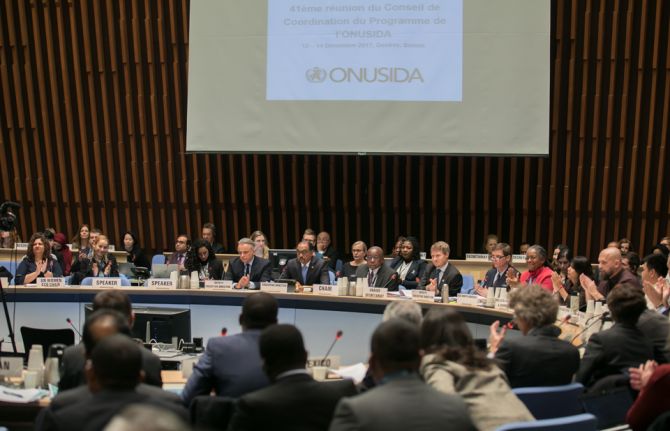
Update
41st meeting of the UNAIDS Programme Coordinating Board opens
12 December 2017
12 December 2017 12 December 2017The 41st meeting of the UNAIDS Programme Coordinating Board (PCB) is taking place in Geneva, Switzerland, from 12 to 14 December.
At the opening, UNAIDS Executive Director Michel Sidibé gave an update on the progress made in the AIDS response and outlined the challenges and opportunities that lie ahead. He stressed that despite the progress made AIDS is not yet over and outlined the five key challenges that remain unaddressed—reaching the unreached, protecting young women and girls, ensuring that men have access to services, focusing on the regions that are lagging behind and addressing stigma, discrimination and criminalization.
During the opening session, Mr Sidibé also announced that Michel Kazatchkine will be the Special Adviser to UNAIDS on HIV, Tuberculosis and Hepatitis for Eastern Europe and Central Asia.
The thematic segment of the PCB meeting will take place on the last day and will focus on accelerating action to end discrimination in health-care settings. The participants will review the evidence of the effects of discrimination in health-care settings on efforts to reach the global HIV prevention and treatment targets and will identify programmatic actions to end such discrimination.
The 41th meeting of the PCB is being chaired by Ghana, with the United Kingdom of Great Britain and Northern Ireland acting as Vice-Chair and Japan as Rapporteur.
Speeches
Related

Update
Closing the HIV resource gap in Nigeria with more domestic funding
14 December 2017
14 December 2017 14 December 2017There is a consensus among political leaders, civil society and development partners that ending AIDS as a public health threat in Nigeria will require increased domestic funding.
In the past 10 years, Nigeria has made progress in its AIDS response. The number of people living with HIV on life-saving antiretroviral therapy in the country grew to more than one million by mid-2017. AIDS-related deaths have been reduced from 210 000 in 2006 to fewer than 160 000 in 2016. Although only 30% of people living with HIV in Nigeria are now on treatment, 81% of people on treatment are virally suppressed.
According to the Society for Family Health, Nigeria, spending on the AIDS response in Nigeria increased from US$ 300 million in 2007 to US$ 730 million in 2013. But the AIDS response has been largely sustained through external funding, especially from the United States President’s Emergency Plan for AIDS Relief and the Global Fund to Fight AIDS, Tuberculosis and Malaria.
In order to increase domestic funding for the AIDS response, efforts are under way for each of Nigeria’s 36 states to contribute up to 1% of their monthly allocations from the federal government to the response to HIV. The Government of Nigeria, with technical support from UNAIDS and the World Health Organization, is also establishing an HIV trust fund aimed at increasing private sector contributions from 2.1% in 2014 to 10% by the end of 2018.
Increases in domestic funding will boost efforts to diagnose the estimated two million people living with HIV in Nigeria who do not know their HIV status and are not yet on treatment. In December 2016, the President of Nigeria, Muhammadu Buhari, launched a Fast-Track plan using domestic resources to maintain 60 000 people living with HIV on HIV treatment and to ensure that an additional 50 000 people access treatment each year.
Quotes
“Nigeria is working hard to reverse the trend of a donor-driven approach to our national HIV programmes, as more financial resources are being allocated for the procurement of medicines.”
“The government should own the HIV response. Putting money into the national response is an investment in humanity.”
“Nigeria has made a remarkable achievement by ensuring access to treatment by more than 1 million people living with HIV. But diagnosing the estimated 2 million people living with HIV who do not know their HIV status and are not yet on treatment is a big challenge. Increased and sustained federal, state and private sector contributions can help us diagnose them and provide access to immediate life-saving treatment.”
Region/country

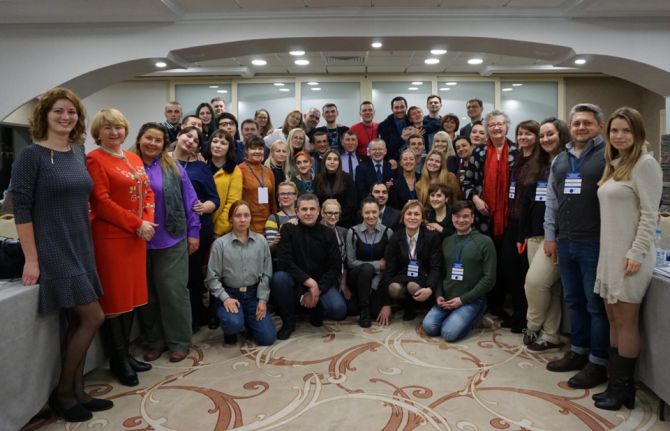
Update
Key populations platform in Ukraine established
13 December 2017
13 December 2017 13 December 2017On 11 and 12 December, representatives of four populations at higher risk of HIV infection—people who inject drugs, sex workers, lesbian, gay, bisexual, transgender and intersex people and former prisoners—gathered in Kyiv, Ukraine, for the legal formalization of the National Platform for Key Communities and to agree on key priorities for advocacy and on how the platform will be managed and operated.
The platform’s priorities will include influencing policies and decision-making processes, the development of a package of HIV prevention services that respond to the needs of key populations and responding to discrimination.
The participants decided on the positioning, role and contributions of the platform in the national AIDS response, the implementation of a Fast-Track strategy and the form of an HIV prevention 100 days of action campaign. They also enthusiastically welcomed continued Dutch, UNAIDS and civil society collaboration and agreed on a unified strategic vision for the participation of civil society and the platform in key events, including the International AIDS Conference, to be held in Amsterdam, Netherlands, in 2018.
The three key advocacy areas for the platform will be:
- The participation of communities in decision-making on health, an effective response to HIV and tuberculosis and the protection of human rights.
- The provision of access to services for key groups focused on the needs of communities that are implemented by the communities and funded by national and local budgets.
- The protection of rights and the prevention of discrimination.
Quotes
“We will do our best to make the platform an effective advocacy instrument to help us to achieve our joint objectives and influence decision-making processes that affect our lives and health.”
“The Government of the Netherlands has been and will continue to support this community-led initiative to make the joint voice of key populations in Ukraine heard and taken into account in strategic decision-making at the national, regional and international levels.”
“The National Platform for Key Communities is a strong, transparent and self-regulated forum of community leaders and individuals with a deep understanding of advocacy and formulating joint positions and statements.”
Region/country
Related

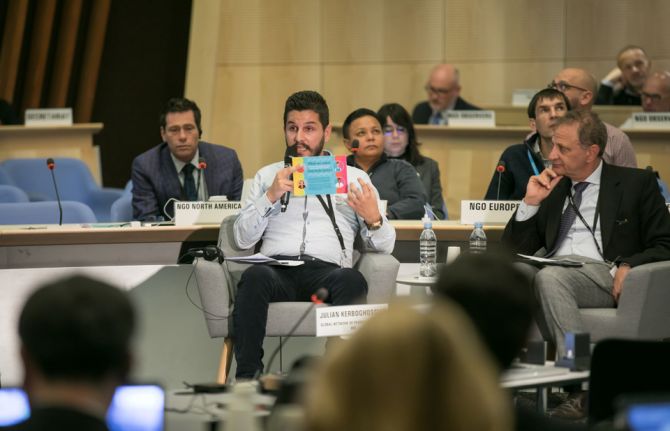
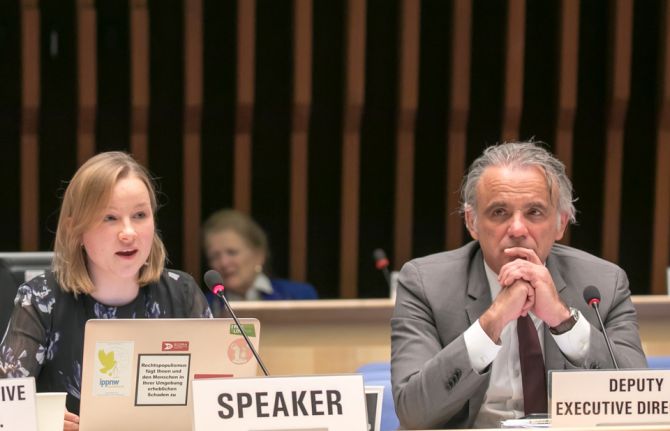
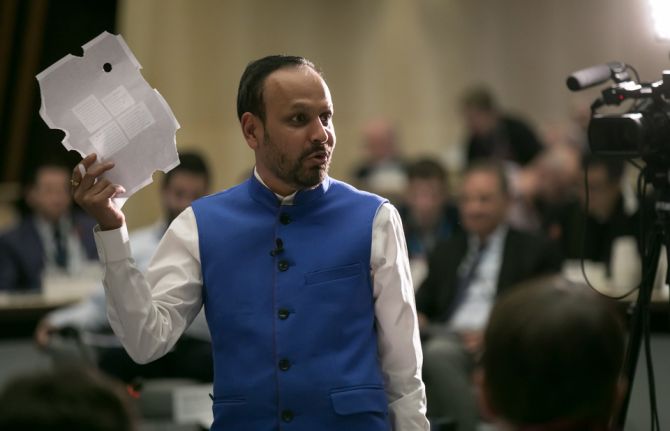
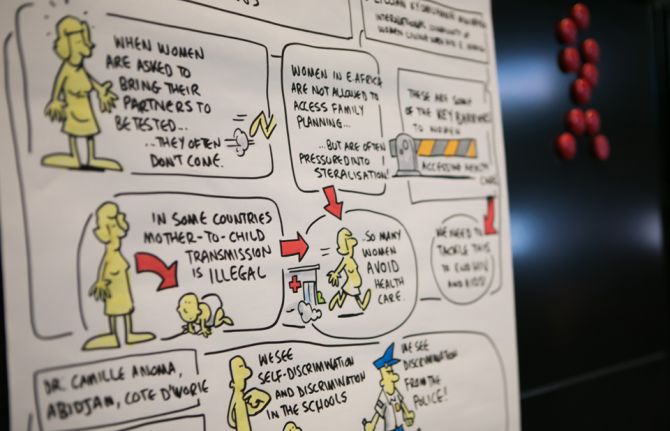
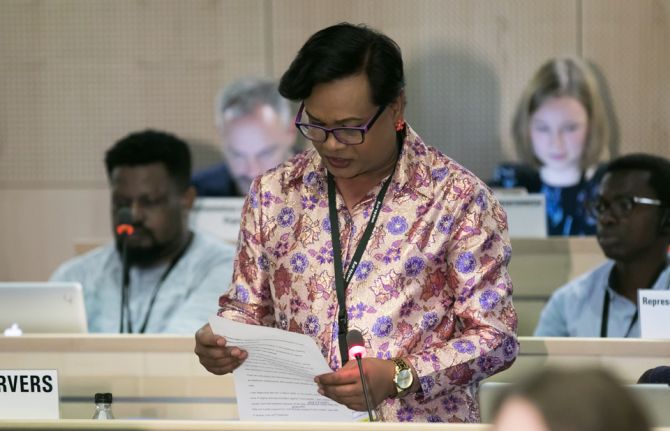
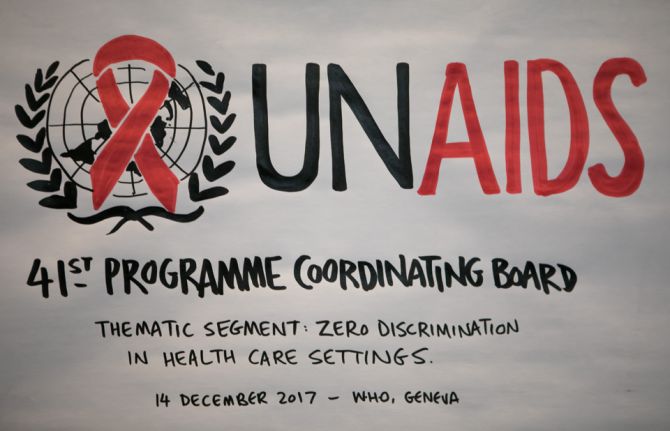
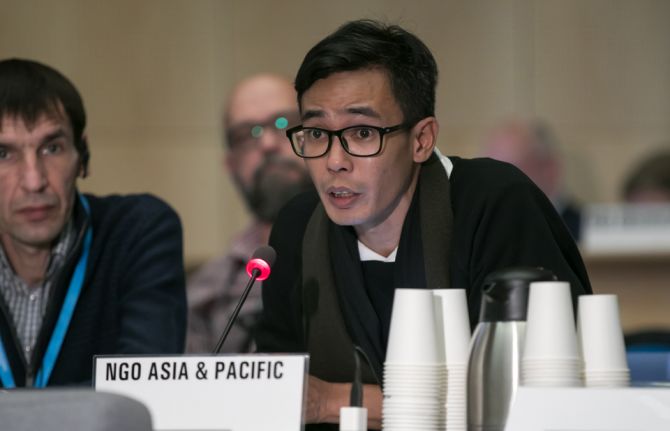
Update
UNAIDS PCB discusses discrimination in health-care settings
15 December 2017
15 December 2017 15 December 2017Discrimination in health-care settings is one of the major obstacles to ending the AIDS epidemic as a public health threat by 2030. Evidence shows that discrimination in health-care settings is widespread across the world, seriously reduces the quality of life of people who experience it and impedes the use of health services, thus preventing people exercising their right to health.
In order to accelerate action to end discrimination in health-care settings, the UNAIDS Programme Coordinating Board—during its 41st meeting, which took place in Geneva, Switzerland, from 12 to 14 December—reviewed the available evidence of the effects of discrimination in health-care settings on the efforts to reach the global HIV prevention and treatment targets and identified programmatic actions to end such discrimination.
Often driven by stigma, discrimination in health-care settings may be manifested when an individual or group is denied access to health-care services that are otherwise available to others, or when care, treatment and/or medical procedures are refused or delayed on a discriminatory basis.
Evidence provided during the meeting shows that discrimination in health-care settings excludes or deters people from seeking health services for fear of stigma, judgemental attitudes or lack of confidentiality. It acts as a barrier to reaching the 90–90–90 targets and has negative impacts along the continuum of care, which encompasses HIV prevention, testing, treatment and sustained viral load suppression.
Where people cannot or will not access health services, they are less likely to be tested for HIV at all, let alone in a timely manner to ensure that they benefit from the early initiation of treatment. Similarly, where people living with HIV do initiate treatment, discrimination can lead to them being lost to follow-up and less likely to adhere to treatment.
Furthermore, health workers are also subject to the same drivers of discrimination as others, including negative attitudes towards people living with HIV, key populations and women and girls. Health-care provider surveys in Thailand reveal that attitudes about HIV among health facility staff may prevent them from adequately caring for people living with or affected by HIV. The attitudes include notions that HIV is a punishment for immoral behaviour, that most people living with HIV do not care if they infect other people and that it can be appropriate to sterilize a woman living with HIV, even without her consent. In some cases, health workers explicitly state that they would prefer not to provide services to members of key populations.
Solving these challenges and eliminating discrimination in health-care settings requires the implementation and scale-up of focused, coordinated, time-bound, evidence-informed, multisectoral actions.
The participants at the meeting agreed upon a set of programmatic approaches to reduce discrimination in health care, including the following:
- Programmes and other measures to eliminate discrimination in health-care settings must be based on the evidence. Discrimination must therefore be monitored, measured and tracked. In particular, it is important to gauge both the experiences of service users and the attitudes and practices of service providers, as well as to monitor the existence and implementation of national-, local- and facility-level non-discrimination policies.
- As part of a comprehensive strategy to eliminate discrimination in health-care settings, countries should provide pre-service and in-service education to the health workforce. This allows health workers to develop human rights and gender equality competencies and strengthens the understanding of medical ethics and workers’ rights, roles and responsibilities in relation to discrimination in health-care settings.
- Countries should review and strengthen laws to prohibit discrimination in the provision and distribution of health services and provide access to remedies for individuals whose rights have been violated, as well as penalties for the perpetrators. Eliminating formal discrimination rooted in laws and policies is one part of the solution. However, states must also put in place measures that protect people living with HIV and members of key populations in and beyond health-care settings.
The participants agreed that addressing stigma and discrimination, including in health-care settings, is a fundamental requirement for achieving the Fast-Track Targets set for 2020 and the promise of the 2030 Agenda for Sustainable Development of leaving no one behind.
Quotes
“Health-care workers need to become human rights defenders. UNAIDS welcomes a global compact for ending stigma and discrimination and calls for the disaggregation of data, interventions in health-care settings, including training, and acting quickly to address all forms of HIV criminalization and other legal and policies barriers to services.”
“Empowering health-care workers and giving them the knowledge and skills from a human rights perspective will help them provide better services.”
“Key populations need to feel safe when they seek health services. In our clinic we bring trust to the communities, providing quality health-care services, a space of confidentiality and a warm welcome.”
“Transgender people have been legally accepted in India since 2003, but the government is taking too much time to enact a bill that addresses the health needs of the community and to provide safe and secure health services for transgender people.”
“Health workers face discrimination as well. They need to be supported not only to fulfil their roles and responsibilities, but also to claim their rights. Health workforces have to be champions of the right to health.”

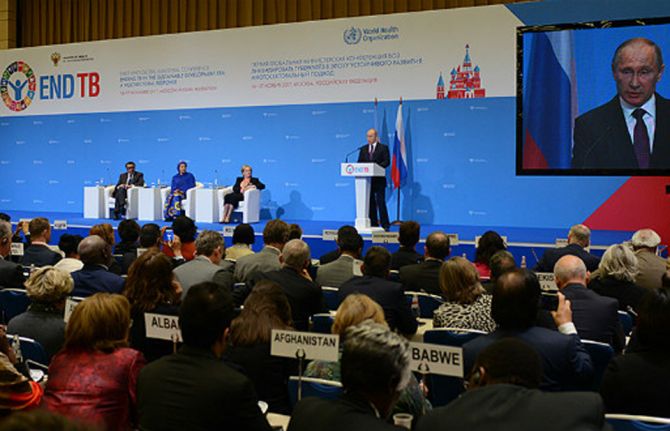
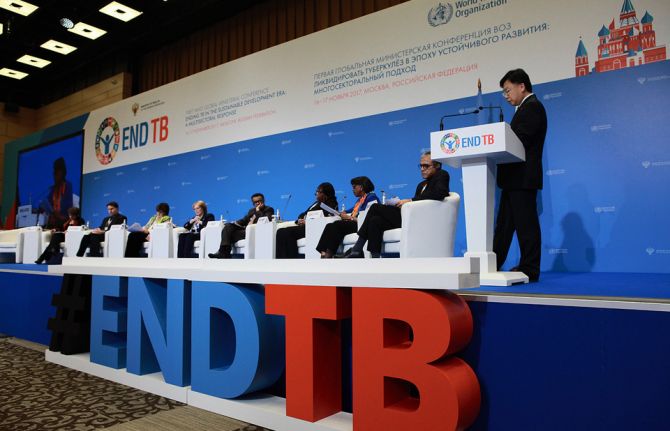
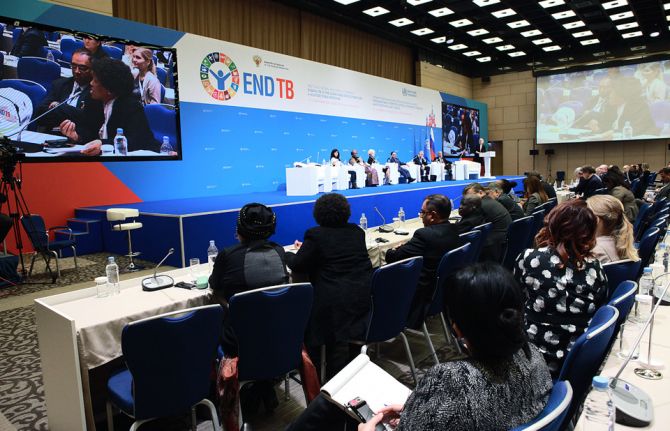
Update
Global ministerial conference ends with adoption of the Moscow Declaration to End TB
23 November 2017
23 November 2017 23 November 2017A global ministerial conference held in Moscow, Russian Federation, on 16 and 17 November that united more than 1000 participants, including 75 ministers and 114 country delegations, concluded with the adoption of the Moscow Declaration to End TB.
The Moscow Declaration to End TB is a new commitment to increase multisectoral action and enhance accountability in the global TB response towards ending tuberculosis (TB) by 2030. The declaration will also inform the first United Nations General Assembly High-Level Meeting on TB, in 2018, which will seek to advance commitments to end TB from heads of state and government.
The declaration outlines the importance of international action to address key areas to respond to TB: sustainable financing, pursuing science, research and development and the establishment of a multisectoral accountability framework.
The conference, the First World Health Organization Global Ministerial Conference on Ending Tuberculosis in the Sustainable Development Era: a Multisectoral Response, was opened by the President of the Russian Federation, Vladimir Putin. It was attended by high-level United Nations leaders, including Amina J. Mohammed, the United Nations Deputy Secretary-General, Tedros Adhanom Ghebreyesus, the World Health Organization Director-General, and Michel Sidibé, the UNAIDS Executive Director.
TB is the world’s leading cause of death from infectious disease—in 2016, 1.7 million people died from the disease—and has profound economic and social consequences. The public health crisis of multidrug-resistant TB continues to deteriorate and TB is the leading cause of death among people living with HIV.
During the conference, Mariam Avanesova, who was treated for multidrug-resistant TB in Armenia from 2010 to 2012 and represents the organization TBpeople, the Eurasian network of people living with TB, handed over the #StepUpforTB petition. The petition is an urgent call for health ministers in key TB-affected countries to ensure that their TB policies and practices are in line with international standards, as defined by the World Health Organization, including testing and treatment of TB and its drug-resistant forms. Initiated by Médecins Sans Frontières and the Stop TB Partnership, the petition has been signed by more than 30 000 people from 120 countries.
Quotes
“We are aware of our responsibility and the extreme importance of this matter, and we are concentrating major efforts and resources to resolve it … reducing mortality from tuberculosis is among our state priorities, along with reducing mortality from cardiovascular diseases and cancer.”
“Tuberculosis is a complex, multisectoral problem that requires a systemic and highly coordinated response to address the conditions that drive the disease. The accountability framework we have agreed to develop marks a new beginning, and with the World Health Organization’s support to coordinate and track progress, we expect the Moscow Declaration to End TB to lead us forward to the high-level meeting of the United Nations General Assembly in 2018.”
“Today marks a critical landmark in the fight to end tuberculosis. It signals a long overdue global commitment to stop the death and suffering caused by this ancient killer.”
“Here in eastern Europe and around the world, HIV programmes need to do much more to find, treat and prevent tuberculosis among people living with HIV.”
“I find it unacceptable that people are dying because either their diagnosis was too late and the medicines didn’t work, or they simply quit because the side-effects from 20 tablets a day for two years were too much. I appeal to all governments to step-up to make timely tuberculosis testing and treatment accessible to all people who need it.”
Region/country
Related

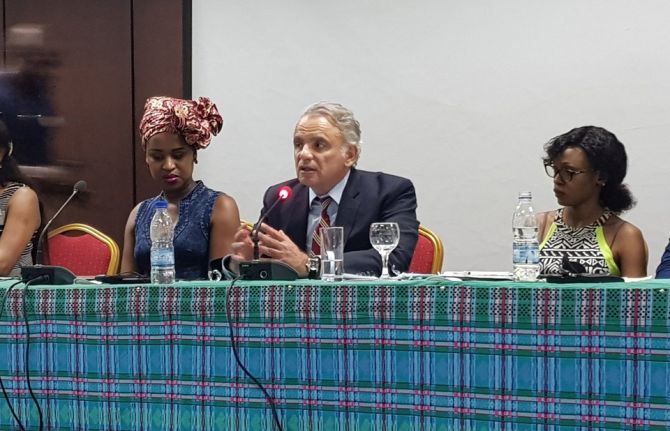

Update
Young African key populations forge alliance at ICASA
04 December 2017
04 December 2017 04 December 2017Young sex workers, transgender people, lesbian women, gay men and other men who have sex with men, people who inject drugs and people living with HIV from across Africa came together on 2 and 3 December for a preconference meeting ahead of the 19th International Conference on AIDS and STIs in Africa (ICASA), being held in Abidjan, Côte d’Ivoire, from 4 to 9 December.
The meeting, entitled Onto the African Map: Youth Key Populations and HIV, was a way for young people to express the challenges that they face, from a lack of opportunities to discrimination and social and legal injustices.
Those barriers make young members of key populations particularly vulnerable to HIV, violence, harassment and a lack of hope. Despite these challenges, attention to the protection of human rights and to the health needs of key populations remains limited in national HIV responses.
The meeting reviewed those challenges and identified key areas of action and recommendations that were compiled in the joint declaration adopted at the meeting. The declaration calls, among other things, for urgent action to stop violence, harassment and other human rights violations towards young people and key populations. It further calls for the participation of young key populations in health, policy and other decision that affect them and stresses the need to increase programmes and investments for services that address the needs of young key populations.
Quotes
“We live in two worlds: one of progress and one where people are still being left behind. We cannot exclude and fail to address young key populations at a time when we are calling to accelerate the AIDS response. Your coming together is a sign of solidarity and leadership by communities to demand recognition and action.”
“By putting the spotlight on young key populations, we are giving voice to the voiceless, we are challenging indifference and we are calling for action now.”
“Violence and denial of services for key populations remains serious across the continent. We will take this Abidjan joint declaration forward and promote it with all governments, donors and others to drive change.”
“I am still hiding my gender identity and sexual preference from my family and community because I know it is not safe to come out as a lesbian woman. I have been forced to be invisible. By being with other young key populations in this meeting, I hope the declaration will help me and others realize that we are here.”
Related
 “Who will protect our young people?”
“Who will protect our young people?”

02 June 2025







